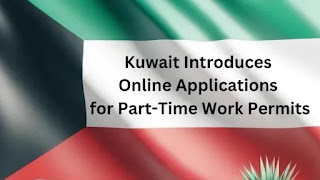Kuwait has ushered in a transformative era in its labor market with the launch of online part-time work permits in 2024. While this initiative spans various sectors, its impact on expatriate educators takes center stage, presenting a significant advancement within the education niche.
In Kuwait’s educational sector, where a considerable segment of the workforce consists of expatriates, the newly introduced online part-time work permit system emerges as a game-changer for teachers seeking additional income and avenues for professional development.
Bureaucratic obstacles are now a thing of the past. The “Sahel” platform facilitates a smooth application process for expatriate educators, simplifying the acquisition of part-time work permits. With just a few clicks, teachers can submit their details and necessary documentation, eliminating the complexities of traditional paperwork
The online system offers flexibility in terms of permit types and durations, accommodating the diverse needs of educators. From short-term commitments to year-long engagements, teachers can select permits that align with their schedules and career aspirations.
Comprehending the rights and responsibilities associated with part-time work permits is crucial for both teachers and employers. Expatriate educators are entitled to fair treatment, including adequate compensation and adherence to labor regulations. Employers, in turn, must uphold ethical standards and provide a conducive work environment.
Beyond individual advantages, the online part-time work permit system empowers educational institutions to optimize resource utilization and enhance the overall learning experience for students.
Educational institutions gain access to a wider talent pool, enabling them to leverage specialized expertise for short-term projects or extracurricular activities. This influx of diverse skill sets contributes to the overall quality of education and fosters a dynamic learning environment.
Part-time engagements serve as catalysts for professional growth among expatriate teachers. By participating in additional educational initiatives or enrichment programs, educators can broaden their horizons and enhance their teaching practices, ultimately benefiting students and the educational community.
As Kuwait’s online part-time work permit system continues to evolve, its impact on expatriate teachers and the educational sector remains profound. By fostering collaboration, innovation, and inclusivity, this initiative sets the stage for a more vibrant and dynamic educational landscape in Kuwait.
In conclusion, the introduction of online part-time work permits heralds a new era of empowerment and opportunity for expatriate teachers, underscoring Kuwait’s commitment to nurturing talent and fostering excellence in education. As educators embrace these newfound possibilities, the ripple effects extend far beyond the confines of the classroom, shaping the future of Kuwait’s educational ecosystem.
